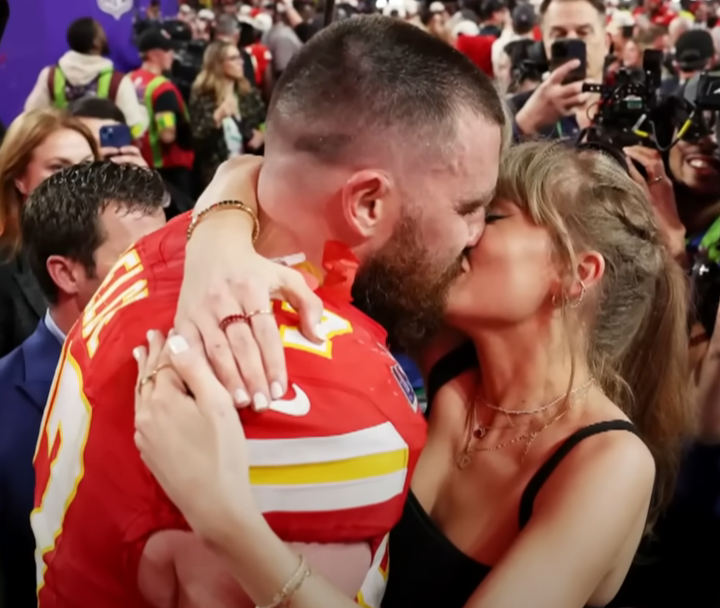I am sure Taylor Swift needs no introduction.
A global pop sensation, the American singer-songwriter has dominated music and pop culture for almost two decades, with the impact of her Eras Tour crashing the Ticketmaster website and emptying the wallets of millions of parents and young adults.
To the dismay of many diehard NFL fans, Swift has recently entered the world of American football through her relationship with Kansas City Chiefs’ tight end, Travis Kelce. As any loyal and loving girlfriend would do, she attended almost every single game he played in the last football season, and the media picked up on it.
With what has been described as “constant camera cuts,” about 0.0035 percent of screen time was allocated to Swift during Kansas City games.
Because of this, Swifties who were previously indifferent to football came flocking to the games in support of “Taylor Swift’s boyfriend.” Meanwhile, traditional NFL fans could often be seen booing the jumbotrons that cut to Swift during games.
And in classic Hallmark movie fashion, the Kansas City Chiefs made it to the Super Bowl this year. In a nail-biting overtime, the “underdog Chiefs” won the game, and the iconic couple shared a kiss in the wake of the team’s victory.
This led some to believe that the Super Bowl was rigged for a Chiefs victory. It definitely made me wonder whether Swift’s influence had anything to do with the outcome, or if this was just one big coincidence. Regardless of whether these conspiracies hold any merit, her impact on the 2023-2024 NFL season has left many asking how powerful a pop singer should be.
Sports games have always cut to celebrities between plays or after commercial breaks, but never on this scale. Anytime Gisele Bündchen, a famous Brazilian supermodel and one of the highest-paid models in the world, came to support her now ex-husband Tom Brady, there was never such a display of fanfare.
As both a Swiftie and a traditional football fan, I have been questioning if the singer is truly ruining football and whether her influence has changed the viewing experience for the worse.
The answer I’ve arrived at is: not necessarily.
But is she being used by the NFL as a tool to make money and be relevant?
Absolutely.
After Swift and Kelce announced they were dating, Kelce’s Instagram following increased dramatically, going from about three million followers to just under seven million. The tight end was also in nearly every football commercial, endorsing companies like Pfizer, Amazon, Nike, L’Homme and Helzberg Diamonds.
Although it was verified that the contracts for Kelce’s commercial cameos were signed before the relationship, the enhanced screen time helped establish the Swift and Kelce brand.
Regardless of how genuine Swift and Kelce’s relationship is, any corporation or PR agent would take the opportunity to make money off of this new market. To maintain a new market of viewers interested, Swifties, in this case, you have to show them what they came to see: Taylor Swift.
Other than Kelce’s increased relevance, the NFL has undergone a huge transformation which many are deeming “The Taylor Swift Effect.” According to Front Office Sports, Swift has made the NFL an estimated $331.5 million in overall revenue, combined from a variety of different sources including print, digital, radio, TV and social media. Additionally, Kelce’s jersey has become one of the most-bought jerseys in the NFL, spiking almost 400 percent in sales overnight.
Additionally, there have been records of a spike in female viewership, and, as mentioned before, an increase in Swifties who don’t necessarily care about football, attending the games and therefore taking up seats of people who actually want to see the game. Even though Swift declined the offer to play at the Super Bowl because she was still re-recording her music, it may have also been so the Super Bowl doesn’t become a “mini Eras concert with a little bit of football sprinkled in.”
Online, Swifties had been seen celebrating the Super Bowl with Swift-themed activities such as “Swiftie-Bowl Bingo,” where Swifties looked for different Taylor Swift cutaways and moments as a bingo game.
As fun as these activities were, I think the Super Bowl was just a little too perfect. The underdog victory, Kelce’s joyous speech (even after having done fairly nothing constructive in the game except shove his head coach Andy Reid) and of course, the perfection that was Swift’s reactions to everything, and the constant coverage on her and her lover after the game.
And sure, we can and should chalk this win all up to statistics. But if the news drops that it was somehow rigged, I would not be the slightest bit surprised, even given that rigging a Super Bowl is highly illegal, and the amount of moving parts would make a rigged game very difficult to pull off.
What makes the situation so fascinating is the massive amount of power that this single person has and the fact that the entire football industry can use her as a prop to rake in a whole new area of viewership.
Even outside of football, it seems like Swift is everywhere now. And it’s getting a little odd, even to Swifties like myself.
This mass influence, in and outside of football, has led some news outlets to believe Taylor Swift is a psy-op, a government-placed prop used to influence the American people. While highly unlikely, Swift would probably be my top contender to influence on such a scale.
Swifties have a reputation for being “crazed” and “obsessed” with Taylor Swift. With the mass influence the singer has over her fans, many have compared being a Swiftie to being a part of a “cult,” that we blindly follow anything she says and does. I find these allegations very humorous, but also truthful in a sense.
There are some nuanced negatives that are arising from Swift’s influence, other than the obvious problems of following a mob. A large portion of Swift’s career is made off of her love stories, and eventual heartbreak anthems. But very few songs portray her being in the wrong. True, there are many relationships where one person is completely at fault, but many relationships end with wrongs being committed by both sides.
With a large young audience, I think it’s important to make sure young people realize that relationships and breakups are messy, confusing and often mutually faulty. And it is not always the man who is the problem.
Swift has established herself as a feminist icon. As a victim of sexist prejudices in the music industry, Swift’s “The Man” tells of her struggles as a female, wondering if she would have more success if she were a man.
Many Swifites immediately condemn the critics of Swift’s success as misogynists. In a way, it feels like many Swifties see an attack on Swift as an attack on feminism itself. They claim that people hate her because they don’t like seeing a successful woman in the music industry.
Generalizations like this are hard to prove or negate because existing prejudices are often justified as “music taste.” Many claim that Swift’s music is “mid,” or undeserving of the praise it receives. But, it is virtually impossible to judge this argument. Music is, and always has been, subjective.
People can dislike Taylor Swift, and that doesn’t mean they’re misogynistic, that doesn’t mean they’re a bigot and that doesn’t mean that they’re a red flag. It may just mean that they have a different music taste than you.
However, to direct hate towards people because of their favorite music artist is just as bad. For all the same reasons I think people shouldn’t be attacked because they don’t like a certain musical artist, they also should not be attacked because they do.
Yes, social media will show Swifties passionately screaming lyrics at the Eras Tour, but so to the attendants of football games when their team scores a touchdown. Yes, we will buy up all the merch, but so do football fans when supporting their favorite team. Yes, we will all chant specific Eras Tour sayings like “One, two, three, let’s go b*tch!” but so do football fans in between plays, with sayings like “Defense attack! Sack that quarterback!”
Because that’s what you do at a concert, that’s what you do as a fan of a musical artist, and that’s what you do as a football fan. And that’s okay. A balance of mutual respect and an understanding of the subjectivity of art is required if Swift is going to continue her visits to the NFL Stadiums, a respect that should be applied to all forms of media.
Swift’s influence is not necessarily the end of the world. The integrity of the game is still there, along with generally the same viewing experience. However, logic proves that one person should not wield such large amounts of power.
It’s always important to think critically and to avoid the mob mentality that many groups are prone to be brainwashed by in modern culture. The influence of Taylor Swift can be dangerous if it is used to manipulate for personal gain. Swift can sway the masses quite efficiently if she does it right. However, Taylor Swift being used as a way to influence is nothing compared to the extent that this power could be applied.
Bottom line is, this power could be used for evils way larger than taking over the NFL.




